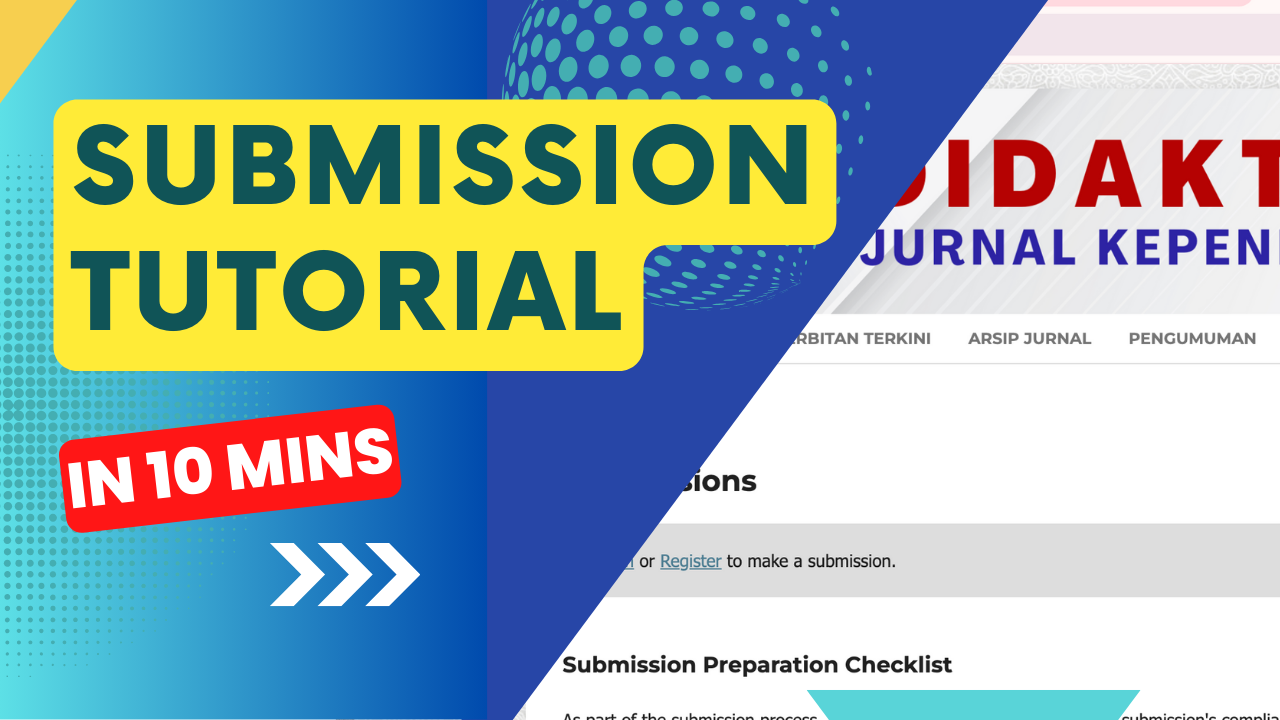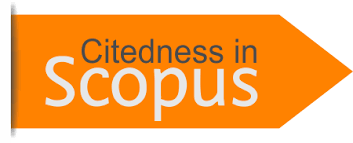Tutor Competence in Online-Learning Service within Distance Education
Abstract The online learning landscape in the Elementary Teacher Education (PGSD) program at Universitas Terbuka Makassar poses significant challenges for tutors, requiring them to adapt to new pedagogical approaches and technologies. This study investigates the competence of tutors in facilitating synchronous online-learning tutoring (Tuweb UT) and asynchronous Learning System Management (LMS) through Silayar UT, which integrates an independent learning program into online platforms. The study examines the tutors' social, strategic, and ethical competence in managing online classes, with a focus on their preparation, planning, and interaction with students. The study uses an ex post facto design with descriptive statistics, analyzing data from 185 tutors in 340 online classes within the undergraduate PGSD program during the 2022 registration term. The findings highlight the tutors' ability to prepare and plan for online tutoring, deploy the tutoring unit (SAT) as a learning service scheme, and incorporate relevant competencies and module characteristics into their tutoring mode. The study also shows that tutoring assignments are given in accordance with competence and that active engagement in Webinar UT and LMS (Silayar UT) is high, with attendance averaging 93.03%. The results indicate that tutors are competent in preparing and planning for online tutoring, incorporating online platforms into their experiences, and fostering active interaction with students, which in turn supports the completion of students' academic trajectories. The study's implications for online learning practices are significant, highlighting the importance of tutor competence in navigating the challenges of online education. Recommendations for further research include exploring the impact of tutor competence on student outcomes and investigating the role of technology in enhancing tutor-student interaction.
Metrics
References
Abou-Khalil, V., Helou, S., Khalifé, E., Chen, M. A., Majumdar, R., & Ogata, H. (2021). Emergency online learning in low-resource settings: Effective student engagement strategies. Education Sciences, 11(1), 24.
Activities in Higher Education: A Case Study of Nepal's Teacher Education. Malaysian Online Journal of Educational Technology, 8(1), 36-47
Almazova, N., Krylova, E., Rubtsova, A., & Odinokaya, M. (2020). Challenges and opportunities for Russian higher education amid COVID-19: Teachers’ perspective. Education Sciences, 10(12), 368.
Amhag, L., Hellström, L., & Stigmar, M. (2019). Teacher educators' use of digital tools and needs for digital competence in higher education. Journal of Digital Learning in Teacher Education, 35(4), 203-220.
Belawati, T. (2019). Pembelajaran online. Jakarta, Universitas Terbuka.
De Metz, N., & Bezuidenhout, A. (2018). An importance–competence analysis of the roles and competencies of e-tutors at an open distance learning institution. Australasian Journal of Educational Technology, 34(5).
Fredricks, J. A., Reschly, A. L., & Christenson, S. L. (Eds.). (2019). Handbook of student engagement interventions: Working with disengaged students. Academic Press.
Hebebci, M. T., Bertiz, Y., & Alan, S. (2020). Investigation of views of students and teachers on distance education practices during the Coronavirus (COVID-19) Pandemic. International Journal of Technology in Education and Science, 4(4), 267-282
Hinojo-Lucena, F. J., Aznar-Diaz, I., Cáceres-Reche, M. P., Trujillo-Torres, J..M., & Romero-Rodriguez, J. M. (2019). Factors influencing the development of digital competence in teachers: Analysis of the teaching staff of permanent education centres. IEEE Access, 7, 178744-178752.
Imara, K., & Altinay, F. (2021). Integrating education for sustainable development competencies in teacher education. Sustainability, 13(22), 12555.
Keskin, S. (2019). Factors affecting students’ preferences for online and blended learning: Motivational vs. cognitive. European Journal of Open, Distance and E-Learning (EURODL), 22(2), 72-86.
Lee, J., Song, H. D., & Hong, A. J. (2019). Exploring factors, and indicators for measuring students’ sustainable engagement in e-learning. Sustainability, 11(4), 985.
Martin, F., & Bolliger, D. U. (2018). Engagement matters: Student perceptions on the importance of engagement strategies in the online learning environment. Online learning, 22(1), 205-222.
McFarlane, K. J. (2016). Tutoring the tutors: Supporting effective personal tutoring. Active Learning in Higher Education, 17(1), 77-88.
Murkatik, K., Harapan, E., & Wardiah, D. (2020). The influence of professional and pedagogic competence on teacher’s performance. Journal of Social Work and Science Education, 1(1), 58-69.
Muslih, M., Supriyanto, R. T., & Sembiring, M. G. (2023). The Effect of Teacher Pedagogic Competence and Discipline on the Performance of Elementary School Teachers during the Covid-19 Pandemic. Edunesia: Jurnal Ilmiah Pendidikan, 4(2), 543-559.
Nastiti, F. E., & Ni’mal‘Abdu, A. R. (2020). Kesiapan pendidikan Indonesia menghadapi era society 5.0. Jurnal Kajian Teknologi Pendidikan, 5(1), 61-66.
Raimanu, G. (2022). Persepsi Mahasiswa Terhadap Implementasi Pembelajaran Daring Pada Masa Pandemi Covid-19 (Studi Pada Mahasiswa Fakultas Ekonomi Universitas Sintuwu Maroso). Ekomen, 20(2), 1-9.
Ratnaningsih, D. J., Belawati, T., Puspitasari, K. A., & Noviyanti, M. (2022, July).Identifying Students’ Behavioral Online Learning Patterns Through Learning Analytics: a Case of Universitas Terbuka. In 5th International Open and Distance Learning Conference Proceedings Book (p. 794).
Rothwell, W. (2010). Effective succession planning: Ensuring leadership continuity and building talent from within. Amacom
Sembiring, M. G. (2022). The Role of Virtual Teacher in the Digital Age: Engraver the Future of Indonesian Golden Generations. International Journal on Research in STEM Education, 4(1), 15-28.
Sukmawati, E., ST, S., Keb, M., Fitriadi, H., Pradana, Y., Dumiyati, M. P., ... & Wijayanto, P. A. (2022). Digitalisasi sebagai pengembangan model pembelajaran. Cendikia Mulia Mandiri.
Teo, T., Unwin, S., Scherer, R., & Gardiner, V. (2021). Initial teacher training for twenty-first century skills in the Fourth Industrial Revolution (IR 4.0): A scoping review. Computers & Education, 170, 104223.
Trisiana, A. (2020). Penguatan pembelajaran pendidikan kewarganegaraan melalui digitalisasi media pembelajaran. Jurnal pendidikan kewarganegaraan, 10(2), 31-41.
Wei, H. C., & Chou, C. (2020). Online learning performance and satisfaction: do perceptions and readiness matter?. Distance Education, 41(1), 48-69.
Copyright (c) 2024 Jamil, Patmawati Halim, Hasanuddin

This work is licensed under a Creative Commons Attribution 4.0 International License.
Dengan mengirimkan naskah artikel, berarti penulis setuju dengan segala kebijakan yang ditetapkan oleh jurnal dan penerbit.
Penulis menyatakan bahwa:
- kebijakan ini telah diketahui dan disetujui bersama oleh semua penulis;
- naskah artikel belum dipublikasikan secara resmi sebelumnya di media ber-ISSN atau ber-ISBN yang terdaftar, kecuali dalam bentuk abstrak atau sebagai bagian dari materi kuliah, atau skripsi/tesis/disertasi yang tidak diterbitkan;
- naskah tidak sedang dalam proses editorial dan dipertimbangkan untuk publikasi di tempat lain;
- publikasi naskah ini telah disetujui oleh semua penulis, institusi afiliasi penulis, otoritas yang bertanggung jawab, dan lembaga di mana kegiatan telah dilakukan;
- naskah berisi materi yang aman dari pelanggaran hak cipta;
Perjanjian Hak Cipta dan Lisensi
- Penulis memiliki hak cipta dan hak kepemilikan lainnya yang terkait dengan artikel.
- Penulis memiliki hak dan diizinkan untuk menggunakan substansi artikel untuk karya-karya penulis berikutnya, termasuk untuk keperluan bahan/materi kuliah dan buku.
- Penulis menyerahkan hak publikasi pertama kepada jurnal dengan di bawah Lisensi Creative Commons (CC BY 4.0).
Pernyataan Lisensi CC BY 4.0
Anda diperbolehkan:
- Berbagi — menyalin dan menyebarluaskan kembali materi ini dalam bentuk atau format apapun;
- Adaptasi — menggubah, mengubah, dan membuat turunan dari materi ini untuk kepentingan apapun, termasuk kepentingan komersial.
Pemberi lisensi tidak dapat mencabut ketentuan di atas sepanjang Anda mematuhi ketentuan lisensi berikut ini.
- Atribusi — Anda harus mencantumkan nama yang sesuai, mencantumkan tautan terhadap lisensi, dan menyatakan bahwa telah ada perubahan yang dilakukan. Anda dapat melakukan hal ini dengan cara yang sesuai, namun tidak mengisyaratkan bahwa pemberi lisensi mendukung Anda atau penggunaan Anda.
- Tidak ada pembatasan tambahan — Anda tidak dapat menggunakan ketentuan hukum atau sarana kontrol teknologi yang secara hukum membatasi orang lain untuk melakukan hal-hal yang diizinkan lisensi ini.





.png)








